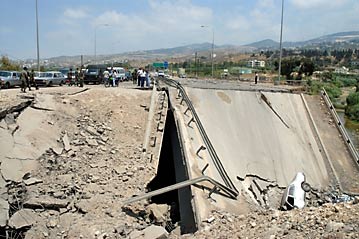Lebanon's returnees need sustained help to rebuild homes, livelihoods
Lebanon's returnees need sustained help to rebuild homes, livelihoods

NABATIYAH, Lebanon, August 21 (UNHCR) - Much of this large town and the surrounding countryside seems untouched by the month of bombing that devastated areas nearer the Israeli border. That image, and its promise of a quick return to normality, is deceiving.
As a team from the UN refugee agency met with the head of the municipality of Upper Nabatiyah, angry people gathered outside the office to ask when relief items promised by the national authorities would arrive. The town is crowded not just with returning residents, but also with people from further south whose villages were totally destroyed.
"It is a difficult situation," said Dr. Mustafa Badredin. "The items are not being delivered as fast as they should from Beirut to the provinces and the municipalities. As a result, we are getting families from south of the Litani River that are moving to our areas, because they are not receiving aid.
"The population of some of the villages south of the Litani has swelled considerably. All these people demand to be assisted," he added. With roads blocked by damage and unexploded ordnance, assistance is only just starting to reach some areas.
In the countryside, fields of tobacco, cactus and olives that were the main source of income are also littered with unexploded shells and bombs. The British-based Mines Advisory Group estimates emergency clearing of explosives in Lebanon will take three months, with comprehensive work an additional six months.
"If you take this fact at face value it is deceiving," Governor Mohamed Al Mawla told UNHCR about the lack of bomb damage in his town. Only selected areas, such as Jibshit, the municipality where the first cell of Hezbollah was formed after Israel's 1982 invasion, were systematically shelled.
"Although the Israeli Defence Force did not target houses, a lot of bombs have been dropped over the fields in Nabatiyah. This is a region that overwhelmingly depends on the farming of tobacco and cactus. The entire harvest has been lost, which means that they will not have any stocks for the winter nor any source of income."
With the extensive needs and growing urgency, the heads of the municipalities urged UNHCR and aid agencies to honour promises to deliver aid quickly. They stressed the need to coordinate to ensure the right material arrives.
"If HCR gives us blankets and plastic sheeting today, we do not want to see another agency come with the same offer," said an official in Sharqeya. "The needs are tremendous, and it is important that agencies fill the gaps and do not duplicate efforts."
The visit to Nabatiyah was part of a methodical effort by UNHCR to establish the needs of the population, most of whom have returned after fleeing the fighting. Nearly a million Lebanese had been displaced.
By the end of Sunday, UNHCR reported 140,000 Lebanese had crossed the border from Syria. If the number who used unofficial entry points are included, UNHCR estimated only a few thousand of the 180,000 Lebanese who found shelter across the border were still in Syria. UNHCR teams were visiting those left behind, probably vulnerable individuals, to see if they need assistance.
A similar situation was reported inside Lebanon, with most of those who fled fighting returning in the first few days after the August 14 ceasefire. However, with many discovering that they had lost their homes or livelihoods, or both, they may require considerable assistance as they rebuild.
"A close friend of mine had some of the best nurseries in the Middle East," said Mustafa Badr Eldin from the municipality of Ebba. "The damage this year to his nurseries alone amounts to $150,000. The war has ruined him completely."
After focusing last week on the distribution of assistance to people as they return, UNHCR is shifting emphasis to their needs back in the villages. Assessment teams were checking areas of heavy damage, including a string of villages along the Israeli border that were at the centre of the war.
One team passed through nine villages, four of which were largely destroyed. Rubble was everywhere, buildings rased, and there was an eerie feeling. The very few people who were seen urgently need relief items. UNHCR will also send a team with an engineer to work on a longer-term plan for the towns.
UNHCR continues to bring in more supplies - additional items arrived on Monday aboard two C-130 flights and a ship into Beirut - and is stocking them in warehouses in Sidon and Tyre to be nearer the areas where they are most urgently needed.
Although most Lebanese around Nabatiyah were bitter about the damage and the time it took the world community and the United Nations to halt the war, they acknowledged the humanitarian efforts of the United Nations to meet their needs.
"This is the first time that a UN agency comes and visits our municipalities," said Mohamed Ahmed Aasi, the mayor of Ansar municipality, thanking a UNHCR team. "We look forward to working with you. See you soon, insh'Allah."
By Reem Alsalem in Nabatiyah, Lebanon








